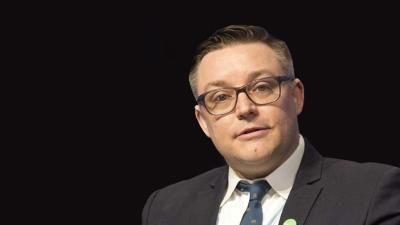
"Discovering Safety is a springboard to success for start-ups"
Discovering Safety is opening its doors for start-up companies, bringing them together with new clients. Kyle Dupont, CEO of Ohalo, offers his insights.
This page is approximately a 4 minute read
This page was published on

Seth Schultz will accelerate a global shift to more resilient critical infrastructure – water, energy, transport and communications – in the face of climate change, population growth and resource scarcity.
At the end of its third year, the Resilience Shift has built a robust knowledge base and a broad community of interest, working in partnership with public and private organisations, to improve the resilience of critical infrastructure for a safer world. Supported by Lloyd’s Register Foundation and global consulting, engineering and design firm Arup, it has published numerous research materials and guidance on resilience practice in target areas of interest such as urban water resilience.
Lloyd’s Register Foundation’s support of the Resilience Shift began in 2016 following publication of our Foresight Review of Resilience Engineering, which recommended that we establish and lead a programme to build resilience within and between critical global infrastructure sectors.
With the appointment of Seth Schultz, the Resilience Shift enters its next stage with a leadership focused on scaling up its global impact, raising awareness of how to embed resilience into practice at the different stages of an infrastructure’s lifecycle.
Seth’s career began working in the environmental space, driven by the need to create change in urban sustainability. He has worked with leading and innovative organisations in this space including the Louis Berger Group, the US Green Building Council, the Clinton Foundation, C40 Cities Climate Leadership Group, the Global Covenant of Mayors, and the Intergovernmental Panel on Climate Change (IPCC).
I am incredibly excited about joining the Resilience Shift team. We live in an increasingly interconnected world that is being pushed to its limit due to climate change, urbanization and population growth. It is more important than ever to prepare for the future by embedding resilience into the building blocks of our society. I look forward to accelerating the discussion about the transformation of our infrastructure, building large-scale commitment among stakeholders to adapt and incorporate sustainability and resilience into our infrastructure and further seeing ways to collaborate on solutions and next steps.
As part of Arup’s alignment with the United Nations Sustainable Development Goals (UN SDGs), the Resilience Shift is leading thinking and practice for critical infrastructure resilience. Its work on urban water resilience, for example, supporting the development of the City Water Resilience Approach, has enabled cities to better understand how water impacts their success and would threaten their future, allowing them to see the actions they need to take to create future resilience. The resilience of our critical infrastructure systems - water, energy, transport and communications - matters in a world where climate change, population growth and resource scarcity are having an increasingly profound effect on the services they provide, making them more vulnerable to shocks and stresses. When these systems fail, the results can be catastrophic. There is an urgent need for a global shift in industry practice that can address these concerns across the whole infrastructure lifecycle.
Seth brings to the Resilience Shift a long track record of building consensus and initiating change in the field of sustainable development. We are very happy to bring him on board to lead the next stage of the Resilience Shift in its aim to accelerate an urgent shift towards better, more resilient infrastructure and help create a safer world.
People all around the world depend on engineered systems – often ‘hidden’ from public view - to deliver food, water, electricity and transport that helps keep us all well and safe. These increasingly fragile systems can fail when subject to shocks and stresses with massive consequences. Seth Schultz will lead the Resilience Shift in developing a global coalition of people who care about public safety, to shine a spotlight on these fragile infrastructures, making sure the right investments are made to keep our essential services going through times of crisis.